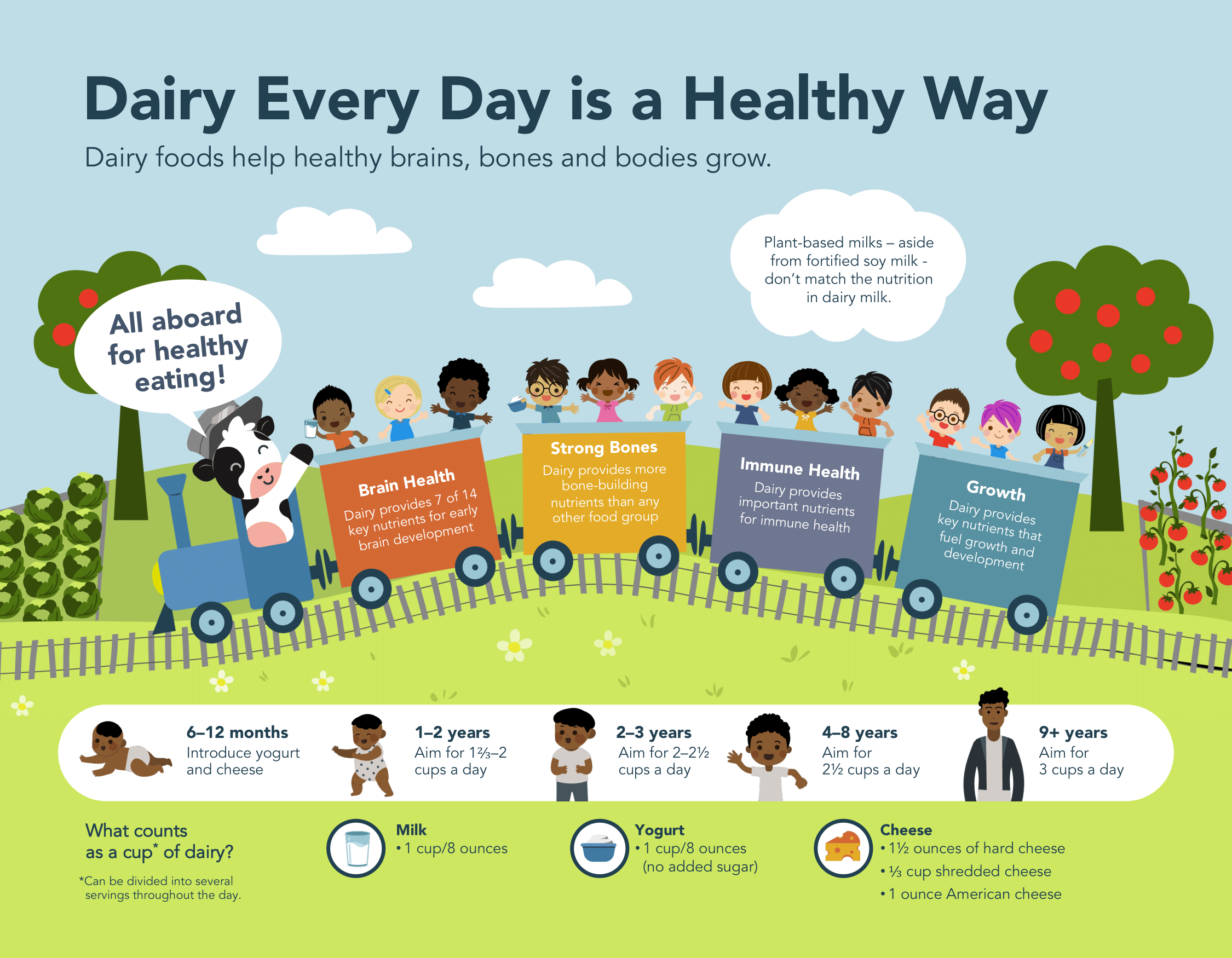The key nutrients in dairy play an important role in child nutrition by supporting growth and development.
There are 13 essential nutrients found in milk including: calcium, protein, vitamin D (in fortified products), phosphorus, vitamin A, riboflavin, vitamin B12, pantothenic acid, niacin, zinc, selenium, iodine, and potassium.
Three servings a day of dairy (for those 9 years and up) contribute 3 of the 4 under-consumed nutrients of public concern – calcium, vitamin D and potassium.
Dairy for Infants
0 – 12 months
For the first time, the current Dietary Guidelines for Americans recommended yogurt and cheese as complementary feeding options for infants as young as six months of age. Here are more details on the recommendations:
- For about the first 6 months of life, exclusively feed infants human milk. Continue to feed infants human milk through at least the first year of life, and longer if desired.
- If human milk is unavailable, feed infants iron-fortified infant formula during the first year of life and provide infants with supplemental vitamin D beginning soon after birth.
- At about 6 months, introduce infants to nutrient-dense complementary foods such as cheeses and yogurt. Encourage infants and toddlers to consume a variety of foods from all food groups.
- At 12 months of age, plain cow milk (whole milk) can be introduced to help meet calcium, potassium, vitamin D, and protein needs.
Dairy for Toddlers
12 – 23 Months
Between 12 and 23 months, toddlers are growing rapidly and need high-quality protein, fats, calcium, and vitamin D to support developing bones, teeth, and brain function. Whole cow’s milk is typically introduced around 12 months as a fundamental source of these nutrients.
Recommendations:
- Transition to whole milk at 12 months of age, providing approximately 2–3 cups (16–24 ounces) per day. This supports caloric needs and ensures adequate fat intake for healthy brain development.
- Allow for variety by offering plain, full-fat yogurt or cheese (e.g., cottage cheese, soft cheeses) in place of or alongside milk, helping to introduce different textures and flavors.
- Balance intake: Avoid exceeding 24 ounces of milk daily, as too much liquid dairy can displace other important foods like iron-rich cereals, vegetables, or fruit.
Dairy for Preschoolers
2 – 5 Years
Preschoolers continue to develop rapidly and dairy remains a key contributor to their daily intake of calcium, protein, vitamin D, and potassium.
Recommendations:
- Offer 2 cups per day of dairy in forms like low-fat or 1% milk, yogurt, or cheese (e.g., slices, cubes, grated).
- Encourage variety: Introduce Greek yogurt, milky smoothies, or cheese slices on whole-grain crackers to keep meals interesting and nutrient-rich.
- Pair with balanced meals: Combine dairy with fruits, veggies, whole grains, and lean proteins to support overall dietary variety and nutrient adequacy.
Dairy for School Age Children
5 Years +
Once children reach school age, they still need consistent intake of calcium, vitamin D, potassium, and protein which are critical for bone mineralization, muscle development, and overall health.
Recommendations:
- Offer 2–3 servings per day of dairy, such as low-fat milk, yogurt, or cheese, based on activity level and caloric needs.
- Smart snacking: Include dairy as convenient, nutritious snacks, like a glass of milk with whole-grain crackers or yogurt with fruit.
- Model and maintain habits: Encourage consumption of dairy‐rich meals at home and be mindful of balanced lunchboxes and after-school meals that include dairy alongside produce and whole grains.



